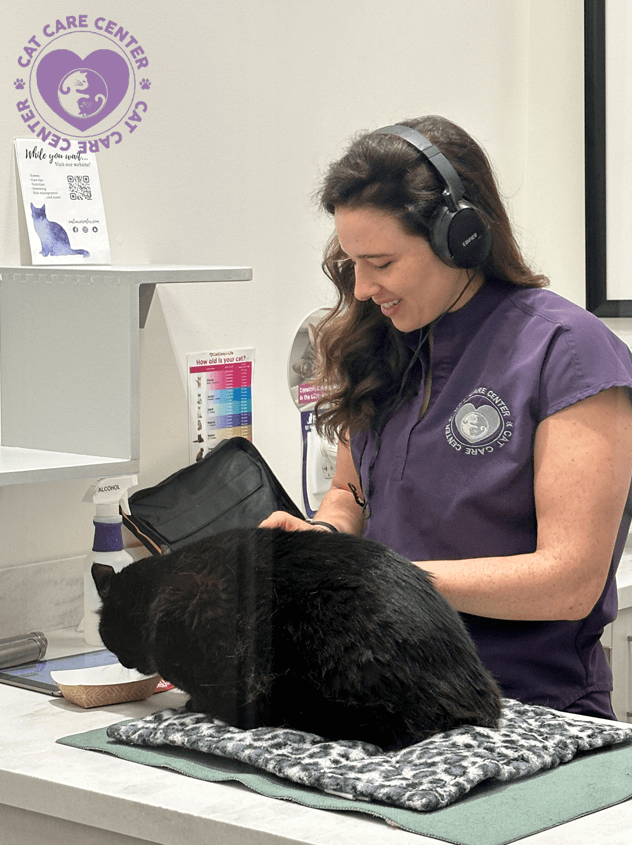
FIP Treatment in Baton Rouge, Louisiana
At Cat Care Center of Baton Rouge, we understand how devastating it can feel to hear your cat may have Feline Infectious Peritonitis (FIP). For decades, FIP was considered an untreatable, fatal disease. Today, thanks to groundbreaking antiviral therapies, many cats can be successfully treated, and we’re proud to offer this care right here in Baton Rouge. If you’ve been searching for FIP treatment near me or FIP treatment in Louisiana, our team is here to help.
What is FIP?
Feline Infectious Peritonitis is a severe disease caused by a mutation of the common feline coronavirus. While many cats carry coronavirus without showing symptoms, in some cats the virus changes and interacts with the immune system in harmful ways. This leads to inflammation that can affect multiple organs and cause serious illness. FIP is most often seen in young cats, pedigree cats, and cats living in multi-cat homes or shelters, though it can affect any age or breed.
Signs and Symptoms of FIP
FIP can look different from cat to cat. Common symptoms include:
• Lethargy or unusual tiredness
• Loss of appetite and weight loss
• Persistent fever
• A swollen belly or difficulty breathing (fluid build-up, “wet FIP”)
• Neurological changes such as tremors, wobbliness, or seizures
• Eye changes like cloudiness, blood in the eye, or uneven pupils
Because FIP mimics other conditions such as cancer or liver disease, diagnosis usually requires a combination of blood work, imaging, and sometimes fluid sampling.
How We Treat FIP
Not long ago, there was no effective treatment for FIP. Today, antiviral medications - particularly GS-441524 - have shown excellent results in managing and often curing the disease.
• Treatment plan: Most cats require a 12-week course of oral antiviral therapy.
• Monitoring: We monitor appetite, weight, lab work, and organ function closely throughout treatment.
• Supportive care: Cats may also need IV fluids, anti-nausea medications, appetite stimulants, or even hospitalization early in the process to help them regain strength.
What to Expect
Most cats respond quickly, often showing improved energy and appetite within days! Research suggests about 85% of cats respond successfully to treatment and remain healthy long-term. A small number may relapse or require dosage adjustments, which is why ongoing follow-up is essential.
FIP Care at Cat Care Center
As Baton Rouge’s only feline-exclusive veterinary hospital, Cat Care Center is uniquely equipped to support families facing this diagnosis. From advanced diagnostics to compassionate long-term care, our veterinarians walk beside you at every step.
If your cat has been diagnosed with or is suspected to have FIP, don’t wait. Call us at 225-228-1039 to schedule a consultation and discuss the latest treatment options available in Louisiana.
FIP Treatment FAQ
Can FIP be cured?
For many years, FIP was considered a fatal diagnosis. Today, antiviral therapy has changed that outlook. Research shows about 85% of cats respond well to treatment, and most remain healthy long-term. Some cats may relapse or require adjustments, but many can be considered cured after completing therapy.
How long is treatment for FIP?
Current recommendations are a full 12-week course of antiviral medication. This duration gives cats the best chance of clearing the virus and recovering fully. Treatment length may vary depending on the type of FIP and how each cat responds.
Is FIP contagious to people or other pets?
No! The coronavirus that causes FIP is specific to cats. It is not the same as COVID-19 and does not infect humans. While many cats carry the harmless form of feline coronavirus, only a small number develop the mutated version that leads to FIP.
What are the chances of recovery?
With early diagnosis and treatment, most cats improve within days. Appetite, energy levels, and fevers often normalize quickly. Long-term studies suggest treated cats stay well for years.
What if my cat doesn’t respond to treatment?
A small number of cats may not respond, particularly if they are very ill at the time of diagnosis. In other cases, cats may relapse during or after treatment. Adjusting medication or adding supportive care can help in some of these situations.
